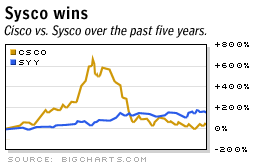
PALO ALTO, Calif. (CNN/Money) -
Everybody wants to know when tech stocks will return to form. There's a better question investors should be asking: Which stocks are the best way to play defense in a (still) troubled economy.
One good answer plays on everybody's favorite financial homophone: Sysco versus Cisco.
You've already heard way too much about the router company. So let's focus just a bit on the country's No. 1 food-service concern, the company I like to call "the other one."
For starters, it may surprise some to know that Houston-based Sysco has outperformed Silicon Valley-based Cisco hands-down for years. You'd expect the solid, lean company to do well against a tech flameout for one or two years. But as a five-year chart shows, Sysco wins hands down (though admittedly, Cisco was kicking tail for a while there).

The reason is simple. Sysco is consistent. It's got 415,000 customers and 46,800 employees. Sales consistently grow in the high single digits, earnings in the low double digits.
Net profit margins are less than three percent. What this means is that even a small screw-up would torpedo the company's bottom line. And in nearly 30 years, Sysco hasn't had one.
Jonathan Feeney, an analyst in New York with SunTrust Robinson Humphrey, stresses that Sysco's strength is how it runs the vast business. Rather than centralize decisions at headquarters, Sysco's management lets its individual operating chiefs -- there are more than 80 of them -- run their own regional and specialty businesses as they see fit.
Of course there are risks. Should Americans curtail their eating out at the restaurants that Sysco supplies, that would hurt results. The acquisitions-hungry company could yet trip up on a purchase; most companies do. And because Sysco has been so successful, investors have bid its shares up to about 25 times expected fiscal 2003 earnings, about double Sysco's earnings growth rate.
| Recently by Adam Lashinsky
|

|
|
|
|
Amusingly, Cisco -- the technology company -- trades for about the same multiple to its forward earnings. Based on what you've seen over the past few years, which company do you think is more likely to fulfill its promise?
Some good Intel-igence
I noted in my last column that Intel's having cut its capital budget by a cool billion dollars was one of the factors weighing on the market. That prompted the following gripe from an Intel employee: "It was only last year (or less) that stock market pundits were rather vocally questioning our company's inordinately large capital expenditure plans for 2002. Now that we have moved a long way toward completing our [latest-generation chip-making] build-out and are (of course) starting to pare down our capital outlays, why is this all of a sudden bad news? $4.7 billion was too much last year, $3.7 billion is not enough this year. What gives?"
Great question. In short, my Intel correspondent is right. That Intel cut its capital budget was a surprise only to the asleep-at-the-switch analysts who expected it to be higher. It's not necessarily bad news for Intel. The bottom line is that Intel has added huge capacity.
And yet, consider that in 2002 Intel earned 51 cents per share on $26.8 billion in sales. In 1995 Intel earned 50 cents on sales of $16.3 billion. Let's see, a penny of earnings growth on billions in capital expenditures and huge volume increases. That's just not a growth company. And there's the "bad" news.
A reluctant reader
I get plenty of hate mail, especially from people who don't understand my contrary nature. And then along comes a missive like this one, from Roxanne M.:
"I used to get so angry with you, about a year ago, because your message was so consistently 'doom and gloom.' I do think the press is more powerful than it sometimes understands.... However, having listened to endless optimistic and pessimistic opinions about the economy and the markets for the last year, I've reluctantly come to the conclusion that you've been right all along. Now I read your columns regularly. When you start sounding upbeat, I'll really take heart. Thanks for telling it like it is. I guess."
Thanks Roxanne. Rest assured, if things look upbeat, I'll say so.
Adam Lashinsky is a senior writer for Fortune magazine. Send e-mail to Adam at lashinskysbottomline@yahoo.com.
Sign up to receive The Bottom Line by e-mail.

|

